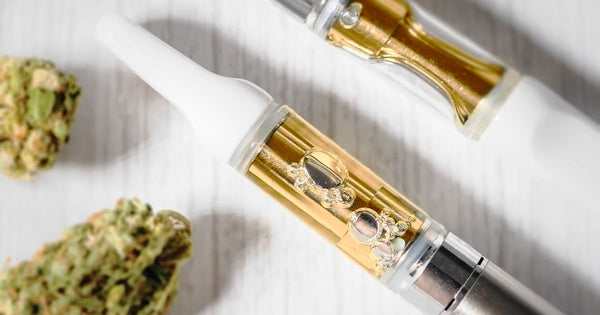Flow Like a Pro: Achieving the Ultimate High with Advanced Cannabis Extraction Flow Control Strategies
Apr 04, 2023

Cannabis extraction and filtration is a complex and intricate process, requiring skilled technicians and advanced equipment to produce high-quality products. Every step must be carefully managed to achieve optimal results.
Flow control is a critical aspect of this process, regulating the movement of liquid or gas through the filtration system to ensure maximum efficiency and minimal waste.
Let’s explore the importance of flow control in cannabis oil filtration. We’ll provide practical strategies for achieving the best possible outcomes in your product processing.
What Is Flow Control?
Flow control refers to the process of regulating the speed and direction of a liquid or gas as it passes through a filtration system. The goal of flow control is to optimize the filtration process, ensuring that the maximum amount of valuable compounds, such as cannabinoids, terpenes, and flavonoids, are extracted from the plant material.
There are several factors involved in flow control, including flow rate, pressure, and filter media selection. By carefully controlling these variables, extraction technicians can achieve consistent and reliable results, producing high-quality cannabis products that meet the strictest standards of purity and potency.
Proper flow control is a critical aspect in many industrial sectors, including food and beverage production, carbon-based fuels, chemical, power, and many other industries. Flow control equipment can handle a broad range of liquids and gases, including water and flammable and poisonous liquids and gases.
Flow control is particularly important in the cannabis industry, where the quality and consistency of the final product are paramount. With the right flow control strategies in place, cannabis extraction facilities can optimize their processes, reduce waste, and ensure that each batch meets the highest possible standards of excellence.
How Is Flow Control Measured?
Mass flow meters measure the mass flow rate of fluids or gases, which is essential for accurate dosing and optimal extraction performance. Mass flow meters work by measuring the amount of mass passing through a flow control valve or another component over a specific period of time. This provides operators with accurate readings of mass flow rates, which can help optimize extraction processes and improve efficiency and product quality.
In cannabis extraction, mass flow meters are commonly used to measure the flow rate of extraction solvents, such as butane or carbon dioxide (CO2), which are used to extract cannabinoids and other compounds from the plant material. Accurately measuring the flow rate of solvents and crude cannabis extract is critical for achieving optimal extraction performance and maintaining safety.
The Benefits of Implementing Effective Flow Control Strategies for Cannabis Products

Effective flow control strategies can provide several benefits for the production of cannabis products.
- Consistency: Flow control strategies can help ensure consistent product quality by regulating the flow of solvents and other materials through the production process. Consistent flow rates can help ensure that each batch of product is produced with the same level of precision and quality, which can be important for maintaining customer satisfaction and brand reputation.
- Efficiency: Flow control strategies can also improve efficiency by optimizing the use of resources, such as solvents and energy. By controlling the flow of materials through the production process, operators can reduce the time and energy required to produce each batch of product. This can result in lower production costs and improved profitability.
- Safety: Flow control strategies are essential for maintaining the safety of the production process. Regulating the flow of solvents and other materials allows operators to minimize the risk of leaks, spills, and other accidents. This is particularly important for the production of cannabis products, which can involve the use of flammable solvents and other hazardous materials.
- Scalability: Effective flow control strategies can help facilitate the scaling of production processes as demand for products grows. Optimizing the use of resources and ensuring consistent product quality allows operators to increase production capacity while maintaining quality and safety standards.
Key Components of Effective Flow Control Strategies
Effective flow control strategies require a combination of careful planning, appropriate equipment selection, and ongoing monitoring and adjustment. Here are some key components of effective flow control strategies:
- Planning: Effective flow control strategies begin with careful planning. This involves identifying the specific flow control requirements of your filtration workflow, selecting appropriate equipment and materials, and developing a comprehensive plan for monitoring and adjusting flow rates as needed.
- Equipment selection: Selecting appropriate equipment is essential for effective flow control. This includes selecting appropriate flow control valves, filtration media, and other components that are compatible with the specific application and desired product quality. Consider factors such as pressure and temperature when selecting equipment to ensure optimal performance.
- Maintenance: Regular maintenance is essential for ensuring optimal flow control performance. This includes regularly inspecting and cleaning equipment, replacing worn or damaged components, and monitoring flow rates and other key parameters to identify any issues that may be affecting flow control.
Flow Control Valves for Optimal Cannabis Extraction: Types and Applications
Cannabis extraction methods involve the use of solvents to separate the desirable compounds from the cannabis plant material. Several types of valves are commonly used in cannabis extraction and filtration to regulate the flow of fluids and gases.
Ball Valves
Ball valves are commonly used in cannabis extraction because they are reliable and durable. They are typically used to control the flow of gas or liquid, such as butane or CO2, through the extraction process. Ball valves are easy to operate and provide a tight seal, which is important for preventing leaks.
Needle Valves
Needle valves are precision flow control valves that are commonly used in cannabis extraction to regulate the flow of solvents or other fluids. They are used to control the pressure and flow rate of the solvent as it passes through the extraction process. Needle valves are typically made of stainless steel, which is corrosion-resistant and easy to clean.
Relief Valves
Relief valves are used in cannabis extraction to protect the system from overpressure. They are typically installed in the lines between the extraction vessel and the collection vessel to relieve excess pressure and prevent the vessel from rupturing. Relief valves are essential for maintaining the safety of the extraction process and preventing accidents.
Troubleshooting Flow Control Issues
Flow control issues can arise in liquid or gas filtration systems, and understanding how to troubleshoot these issues is important for maintaining optimal system performance. Here are some common flow control issues that may arise in filtration systems and tips for troubleshooting them:
- Blockages: Blockages can occur when particles or debris accumulate in the filtration system and restrict the flow of fluid. To troubleshoot this issue, it may be necessary to disassemble the system and inspect each component for blockages. Cleaning or replacing clogged filters or screens may also be necessary to restore flow.
- Leaks: Leaks can occur when there is a breach in the filtration system that allows fluid to escape. To troubleshoot this issue, inspect all connections and seals in the system for signs of damage or wear. Tightening or replacing damaged connections or seals may be necessary to prevent further leaks.
- Pressure drops: Pressure drops can occur when there is a significant reduction in pressure across the filtration system, which can negatively impact flow control. Check the pressure at various points in the system and compare these readings to the expected pressure drop. If the pressure drop is excessive, it may be necessary to adjust flow rates, replace clogged filters, or address other underlying issues.
Polar Filter Media: Revolutionizing Cannabis Filtration
Media Bros is revolutionizing the cannabis filtration industry by introducing a crucial factor that has long been overlooked in flow control: polarity. Our innovative filter media is polar, which creates a polar bond between the elements present in the oil and the media itself. This unique quality allows for more efficient and effective filtration, reducing the amount of contact time required to achieve optimal results.
The polarity present in Media Bros filter media has several benefits. First, it enables the media to scrub the oil more effectively, resulting in a higher-quality final product. By creating a stronger bond with the oil, the filter media can remove impurities and unwanted compounds with greater efficiency, leading to improved potency and purity.
Second, flow rate plays a crucial role in the efficacy of polarity. When flow rate is optimized, the polar bond between the oil and filter media is maximized, resulting in even greater efficiency and effectiveness. This means that by using Media Bros filter media in conjunction with effective flow control strategies, cannabis extraction facilities can achieve optimal results with minimal waste and maximum efficiency.
In an industry where quality and consistency are paramount, Media Bros filter media is a game-changer. By introducing polarity to the cannabis filtration process and optimizing flow control, extraction technicians can produce high-quality products that meet the standards of cannabis connoisseurs.
Optimizing Cannabis Filtration with Granular Filter Media
When it comes to cannabis filtration, granular media has several advantages over powder, particularly when it comes to the efficacy of polarity. Media Bros' granular filter media allows for accurate control of flow rate through the use of various valve types, enabling the full potential of the relationship between polarity and flow to be realized. This precise control results in consistent output every single time.
The width of the valve controls the flow rate of the oil, which determines how long the oil spends in the column. By adjusting the flow speed, extraction technicians gain control over the process, allowing them to optimize the flow rate and polarity bond. In contrast, powder has only one flow rate, determined by the density at which it is packed. This means there is no flow control and the consistency of the output depends solely on the pack density, leading to non-uniform flow rates and inconsistency in output.
In addition to the lack of flow control, powder media can also result in wasted time and contamination issues. The pack density can cause the residence time to be too long, leading to lost time and possible leaching of the media back into the oil, which can contaminate the final product.
Granular media, on the other hand, offers more control and flexibility. The use of granular media with advanced flow control strategies results in a more efficient and effective filtration process, optimizing the polarity bond and removing impurities and unwanted compounds more effectively. This leads to a higher-quality final product with improved potency and purity.
Overall, the use of granular filter media, such as Media Bros', enables extraction technicians to take full advantage of the relationship between polarity and flow, resulting in consistent, reliable output every time. With greater control and flexibility, granular media is a superior choice for cannabis filtration and should be considered for any extraction facility looking to produce high-quality, consistent cannabis extracts.
Filter Media Sample Request
Interested in trying our filter media? We would love to send you some! Browse our products, then fill out this form and someone from our team will be in touch to finalize your request.







